The SSD Relapse: Understanding and Choosing the Best SSD
by Anand Lal Shimpi on August 30, 2009 12:00 AM EST- Posted in
- Storage
PCMark Vantage: Used Drive Performance
Immediately after finishing my PCMark Vantage runs on the previous page, I wrote one large file sequentially to the rest of the drive. I then deleted the file, rebooted and re-ran PCMark Vantage. This gives us an idea of the worst case desktop performance of these drives as you create, delete and generally just use these drives.

The biggest difference here is that the Samsung based OCZ Summit drops from 5th to 9th place. All of the drives get slower but the Indilinx drives hardly show it. When it comes to dealing with write speed, SLC flash does have the advantage and we see the X25-E and Vertex EX rise to the top of the pack. The G2 is slightly faster than the G1 and the Indilinx drives follow in close pursuit.
The mechanical drives don't change in performance since they don't get slower with use, only as they get more full.
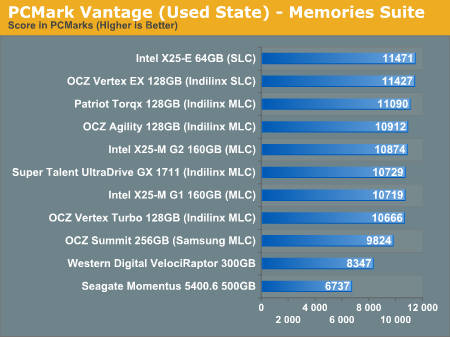
Again we see the two SLC drives at the top, this time followed by a mixture of Indilinx/Intel drives, and the Samsung based Summit is at the bottom of the pack before we get to the HDDs.
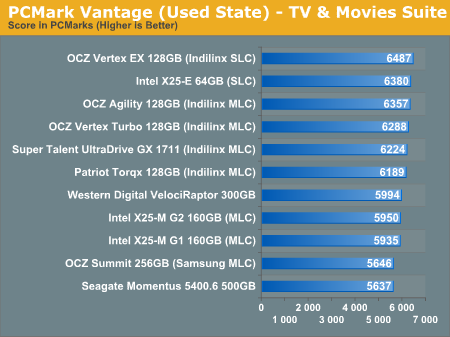
The spread in SSD performance here is only 10% between the slowest non-Samsung drive and the fastest. That tells me that we're mostly CPU bound, but the worst performers other than the Samsung drive are the two Intel X25-Ms. That part tells me that we're at least somewhat bound by sequential write speeds. Either way, the Indilinx drives have a good showing here.
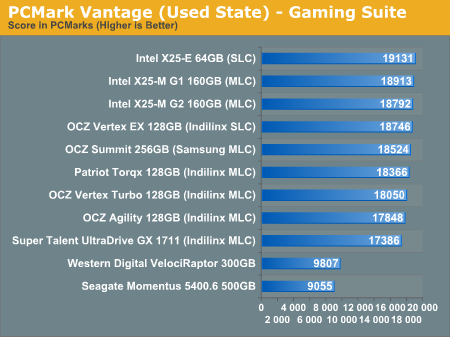
Intel followed by Indilinx SLC with Samsung in league with the MLC Indilinx drives. This is an SSD's dream.
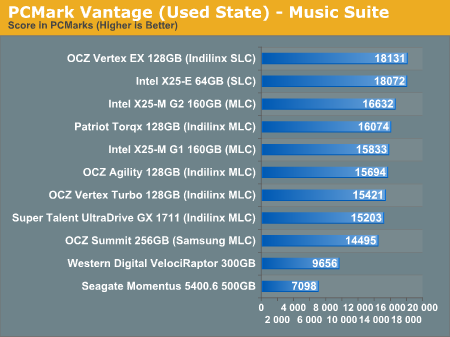
Despite the improvements, the G2 can't touch the much lower write latency of SLC flash here. The Indilinx and Intel G1 drives intermingle while the Samsung drive pulls up the rear. All are faster than a regular hard drive of course.
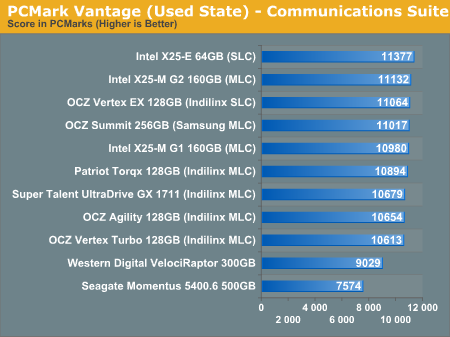
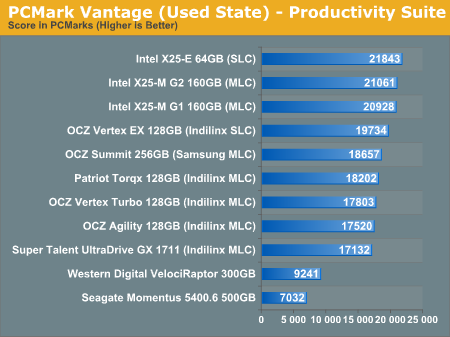
In the multitasking test we once again see Intel rise to the top. The Samsung drive does surprisingly well and the Indilinx drives continue to perform admirably.
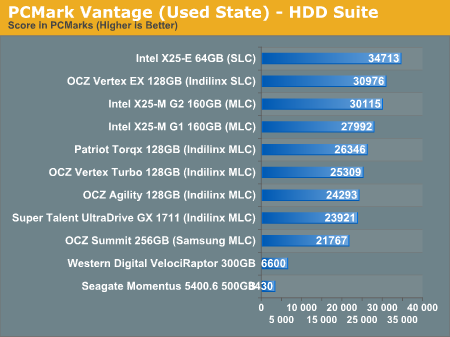
The breakdown between SSDs here is almost linear. The X25-E leads the pack, followed by OCZ's SLC drive. The G2 and G1 are next, then a ton of Indilinx MLC drives. The slowest SSD? The Samsung based Summit of course.










295 Comments
View All Comments
zodiacfml - Wednesday, September 2, 2009 - link
Very informative, answered more than anything in my mind. Hope to see this again in the future with these drive capacities around $100.mgrmgr - Wednesday, September 2, 2009 - link
Any idea if the (mid-Sept release?) OCZ Colossus's internal RAID setup will handle the problem of RAID controllers not being able to pass Windows 7's TRIM command to the SSD array. I'm intent on getting a new Photoshop machine with two SSDs in Raid-0 as soon as Win7 releases, but the word here and elsewhere so far is that RAID will block the TRIM function.kunedog - Wednesday, September 2, 2009 - link
All the Gen2 X-25M 80GB drives are apparently gone from Newegg . . . so they've marked up the Gen1 drives to $360 (from $230):http://www.newegg.com/Product/Product.aspx?Item=N8...">http://www.newegg.com/Product/Product.aspx?Item=N8...
Unbelievable.
gfody - Wednesday, September 2, 2009 - link
What happened to the gen2 160gb on Newegg? For a month the ETA was 9/2 (today) and now it's as if they never had it in the first place. The product page has been removed.It's like Newegg are holding the gen2 drives hostage until we buy out their remaining stock of gen1 drives.
iwodo - Tuesday, September 1, 2009 - link
I think it acts as a good summary. However someone wrote last time about Intel drive handling Random Read / Write extremely poorly during Sequential Read / Write.Has Aanand investigate yet?
I am hoping next Gen Intel SSD coming in Q2 10 will bring some substantial improvement.
statik213 - Tuesday, September 1, 2009 - link
Does the RAID controller propagate TRIM commands to the SSD? Or will having RAID negate TRIM?justaviking - Tuesday, September 1, 2009 - link
Another great article, Anand! Thanks, and keep them coming.If this has already been discussed, I apologize. I'm still exhausted from reading the wonderful article, and have not read all 17 pages of comments.
On PAGE 3, it talks about the trade-off of larger vs. smaller pages.
I wonder if it would be feasible to make a hybrid drive, with a portion of the drive using small pages for faster performance when writing small files, and the majority of it being larger pages to keep the management of the drive reasonable.
Any file could be written anywhere, but the controller would bias small writes to the small pages, and large writes to large files.
Externally it would appear as a single drive, of course, but deep down in the internals, it would essentially be two drives. Each of the two portions would be tuned for maximum performance in different areas, but able to serve as backup or overflow if the other portion became full or ever got written to too many times.
Interesting concept? Or a hair brained idea buy an ignorant amateur?
CList - Tuesday, September 1, 2009 - link
Great article, wonderful to see insightful, in depth analysis.I'd be curious to hear anyone's thoughts on the implications are of running virtual hard disk files on SSD's. I do a lot of work these days on virtual machines, and I'd love to get them feeling more snappy - especially on my laptop which is limited to 4GB of ram.
For example;
What would the constant updates of those vmdk (or "vhd") files do to the disk's lifespan?
If the OS hosting the VM is windows 7, but the virtual machine is WinServer2003 will the TRIM command be used properly?
Cheers,
CList
pcfxer - Tuesday, September 1, 2009 - link
Great article!"It seems that building Pidgin is more CPU than IO bound.."
Obviously, Mr. Anand doesnt' understand how compilers work ;). Compilers will always be CPU and memory bound, reduce your memory in the computer to say 256MB (or lower) and you'll see what I mean. The levels of recursion necessary to follow the production (grammars that define the language) use up memory but would rarely use the drive unless the OS had terrible resource management. :0.
CMGuy - Wednesday, September 2, 2009 - link
While I can't comment on the specifics of software compilers I know that faster disk IO makes a big difference when your performing a full build (compilation and packaging) of software.IDEs these days spend a lot their time reading/writing small files (thats a lot of small, random, disk IO) and a good SSD can make a huge difference to this.